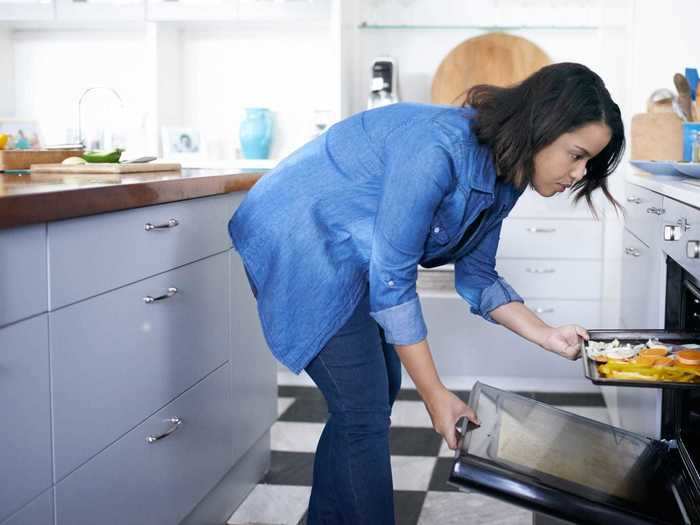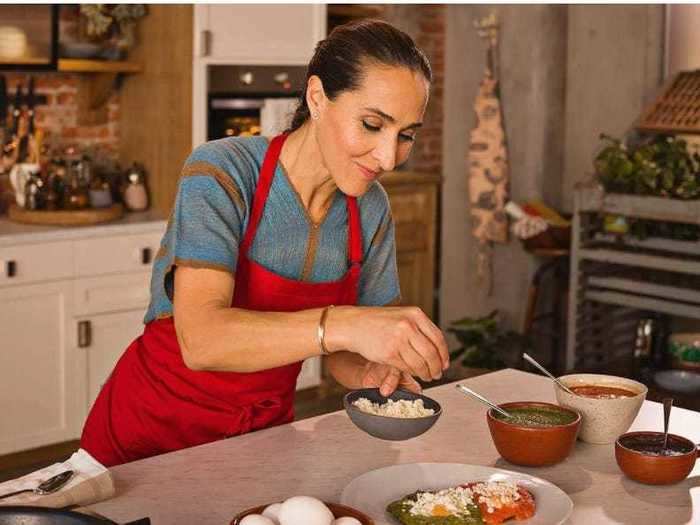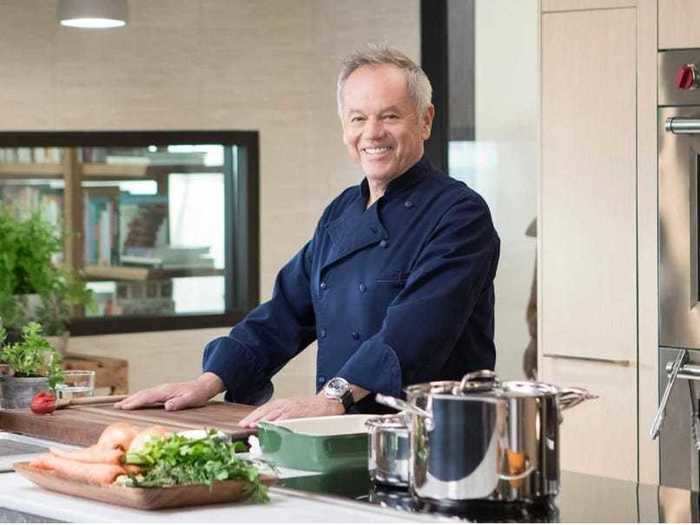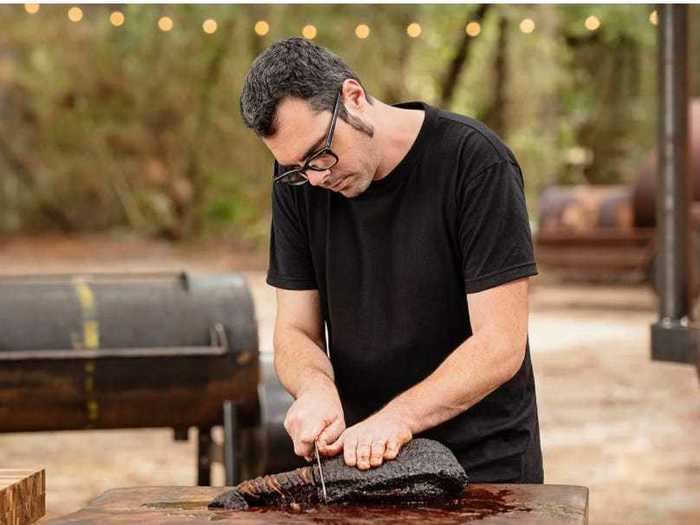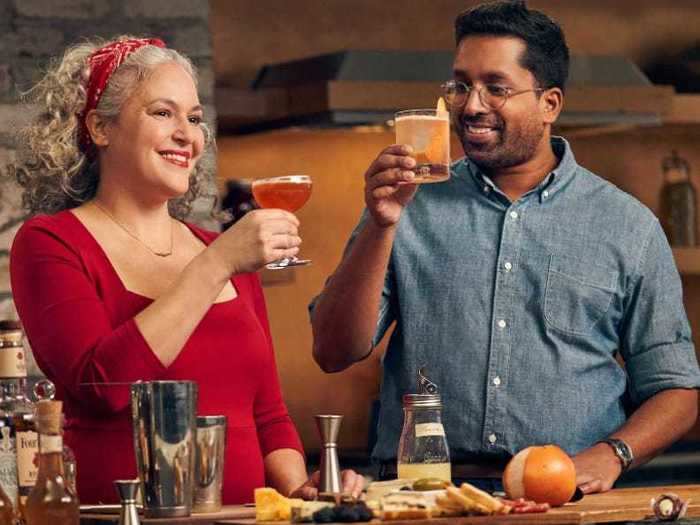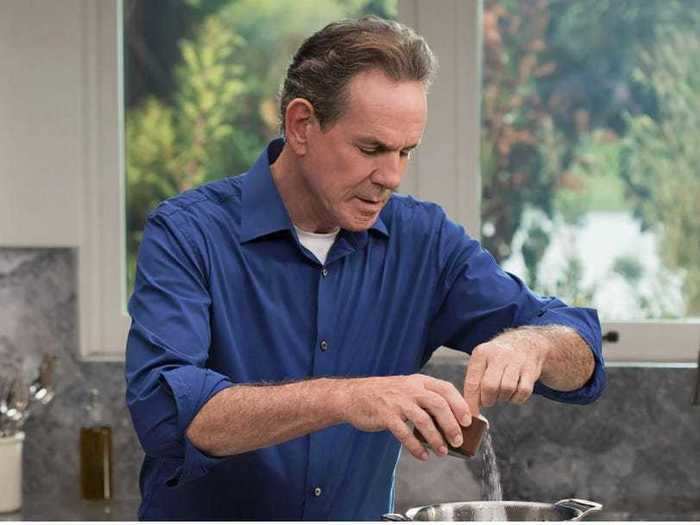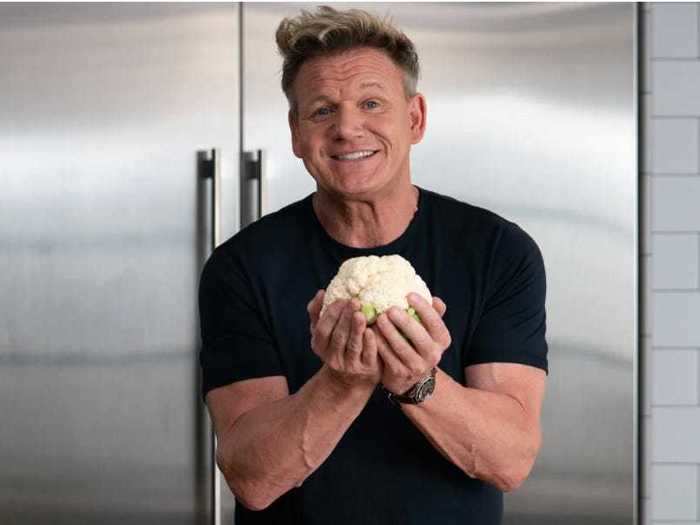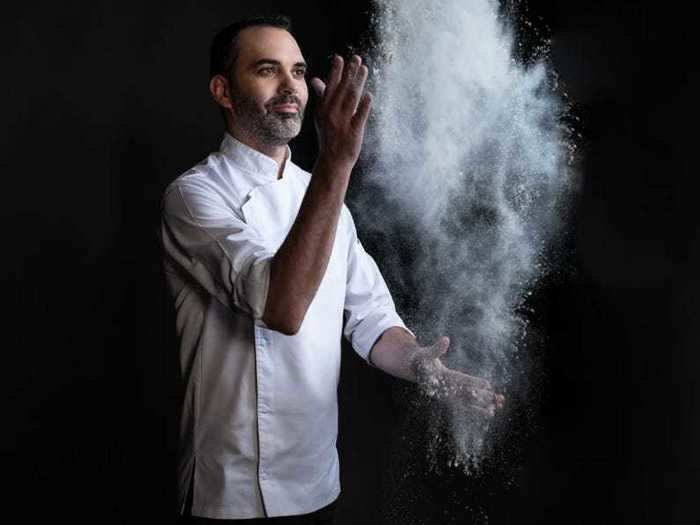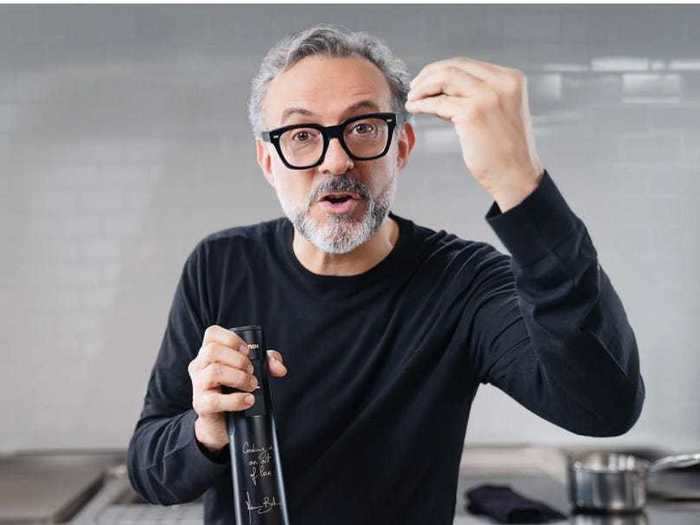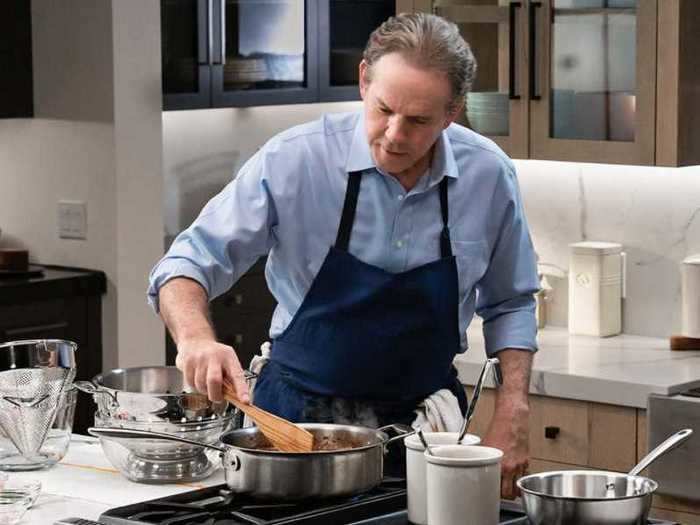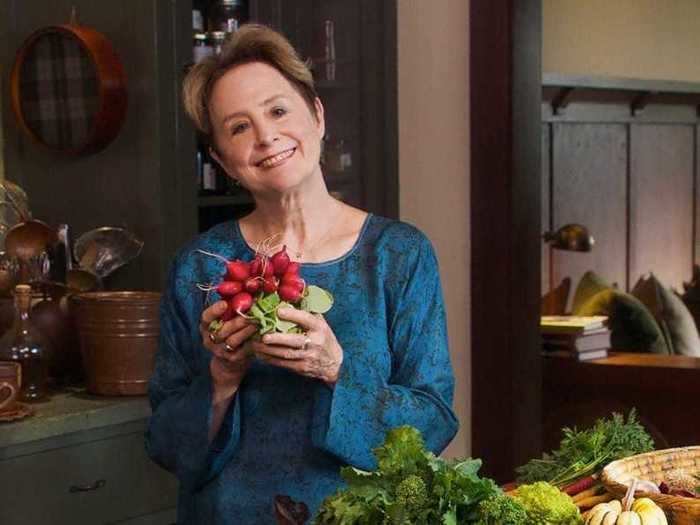BI
When you buy through our links, we may earn money from our affiliate partners. Learn more.
- You can learn from top chefs around the world with the online learning service MasterClass.
- Each class teaches you to make an array of dishes using easy-to-find and affordable ingredients, and helps you develop skills that are useful for a variety of tasks.
- Read more: The 13 coolest classes on MasterClass, including business and leadership with Bob Iger, creative writing with Margaret Atwood, and cooking techniques with Thomas Keller
With states issuing stay-at-home orders during the novel coronavirus pandemic, many of us have been thrust into the role of full-time home chef, among many others. If you don't have experience making complete meals day after day, this task may seem overwhelming. And, it didn't help that you never knew what would be available at your local supermarket or at online grocery stores.
What is MasterClass?
For $180, MasterClass gives you unlimited access to culinary arts courses from some of the top chefs in the world, including Gordon Ramsay, Wolfgang Puck, and Alice Waters. It's an expensive investment, but know that each course includes multiple lessons or episodes — one even has as many as 36 episodes.
Each class is broken up into easily-digestible lessons and supported by a full-color PDF workbook featuring recipes and tips. Additionally, there is a community forum specific to the class where you can post questions, get extra info, and potentially interact with the instructor.
Also included in your membership is access to classes in film & TV, music & entertainment, writing, business, design, sports, and more.
For a full rundown of MasterClass, read our review over here.
What to know before taking a cooking course on MasterClass
In my hours of watching and testing the cooking courses, I picked up a few tips that might enhance your experience.
First, watch the whole lesson before attempting to make a dish. You don't necessarily have to watch the previous lessons, though it often helps. However, you do need a good idea of the whole process before getting started on a recipe. I found it helped to bring my laptop into the kitchen with me, and I'd reference the workbook and the video — making frequent use of the pause button — while preparing meals.
When taking the cooking classes, don't get discouraged if you don't get it right the first time. All of the chefs are encouraging, but several stress the importance of practice. If anyone could quickly and easily produce restaurant-quality meals, these chefs would be out of a job. They break down the steps so you can easily learn them, but it may take a few tries before you can master beef wellington or perfect the fruit tart.
Fresh ingredients are also a must. Yet, the instructors understand that substitutions often need to be made based on where you live and availability, and they make recommendations.
Some chefs suggest you turn to local sources for your ingredients when possible. You'll usually find the freshest ingredients at your local farmers' market. Or, you might consider signing up for a community-supported agriculture (CSA) program, which is a subscription-based service that provides you with weekly boxes of fresh local farm products. In addition to the environmental and economic benefits, CSAs can help you minimize your time in grocery stores, where social distancing is virtually impossible.
Along with watching and engaging with several episodes of every culinary arts course on MasterClass (read more about our evaluation methodology below, after our recommendations), we researched reviews and ratings of the classes from other experts.
All of the courses we recommend produced mouthwatering meals in our tests, can be followed easily in your home without special equipment or ingredients, and that are helpful to a broad range of skill levels.
Here are the 11 best culinary arts and cooking classes you can take at home with MasterClass:
Click each link to go directly to our review of the class, or keep reading to learn about all of them.
Read the original article on
Business Insider
How we evaluated the culinary arts courses
mapodile/Getty Images
The $180 price is very expensive for online courses, even if they are taught by award-winning chefs around the world. That's why we tested and reviewed MasterClass with a more critical eye.
I spent hours and hours in front of the screen watching and following all of the culinary arts courses offered on MasterClass. I spent even more time in the kitchen trying my hand at following the tips and skills taught in the classes.
Here are the main attributes we look for and how we evaluate them:
Generalizability: Will what you learn in the course be helpful when you make other cuisines? Will it help you create your own dishes? I paid special attention to this when watching the lessons and following the recipes. For instance, learning precise knife skills is helpful when prepping any meal. However, learning to debone one specific species of fish that isn't even available in your area might not be that useful.
Accessibility: Due to the current pandemic, I had a hard time procuring various ingredients — the stores in my area can be hit or miss. A good MasterClass course or chef will teach you how to cook with easy-to-find ingredients or offer suitable substitutes. Also, you shouldn't need specialized equipment. If a class required devices that have limited applications, such as a grain mill or a tortilla press, it lost points in our evaluation.
Meal Quality: If you're taking the time to learn how to cook from the best chefs in the world, you'd expect the resulting meals to be restaurant-quality. Based on the assessments from my wife, two sons, and myself, I used four criteria to assess dish quality: taste, appearance, likelihood to make again, and if the dish was good enough to serve in a nice restaurant.
Enjoyability: Does the instructor make it fun to make the dishes? Does it take a long time to prep and cook the meals? I looked at both of these questions when assessing how enjoyable a course was.
Quantity: How many lessons are there? How many minutes of video are there? How much info is in the PDF workbook that comes with the course? Are the discussion forums active? These factors all played a role in determining whether a course provided enough bang for your buck.
'Mexican Cooking' with Gabriela Camara
MasterClass
I absolutely loved the flavors of the Huevos Rancheros recipe Camara shares. It also encouraged me to make salsa verde for the first time, which was easy and delicious.
Her course is rather short compared to others – only 13 lessons and less than three-and-a-half hours of content. Also, the skills you learn don't really translate to other cuisines.
Still, if you're interested in learning how to make authentic Mexican cuisine, including tortillas, this course is worth your time and money.
'Cooking' with Wolfgang Puck
MasterClass
The celebrity chef walks you through his philosophy on cooking and business, how to train your palate, kitchen essentials, and even cocktails in addition to several inspired recipes. I liked that the skills you learn in the course can be used in a variety of contexts.
However, I relied heavily on the closed captioning due to Puck's heavy Austrian accent. Also, I made his Béchamel Sauce, an easy enough recipe, but found it lacked much depth of flavor.
'Texas-Style BBQ' with Aaron Franklin
MasterClass
This is another course that will only appeal to a limited audience: those who have smokers and want to up their game.
From picking the right wood and maintaining the fire to choosing the right smoker design, Franklin dives into the details of what you need for a good smoke. He shows you how to trim and season your meat.
I don't have a smoker, but I tried the pork butt recipe in my oven following all of the same steps. Though they weren't smoking, the results were outstanding nonetheless. This class would be the ideal gift for anyone who is just getting into smoking.
'Mixology' with Lynnette Marrero & Ryan Chetiyawardana
MasterClass
This course focuses on making top-notch alcoholic beverages using readily available ingredients and equipment. There's four and a half hours of content and a beautiful 53-page PDF giving recipes and more details about the drinks.
As a teetotaler, I was bummed that Marrero and Chetiyawardana didn't provide many alcohol-free substitutes. Still, if you want to up your cocktail skills, this class is for you.
'Cooking Techniques I: Vegetables, Pasta, and Eggs' with Thomas Keller
MasterClass
There's a lot to like about the first of Thomas Keller's three MasterClass courses. First of all, it provides more material than any other culinary class: 36 lessons, nearly 7 hours of video, 119-page full-color workbook, and an active discussion forum.
But Keller's emphasis on "tools of refinement" can be a bit much for beginning cooks, though I now find myself regularly putting in the extra effort to make his omelet recipe.
'Cooking I' with Gordon Ramsay
MasterClass
Even if you're just starting to find your way around the kitchen, "Cooking I" with Gordon Ramsay has a lot to offer with a balanced collection of lessons ranging from kitchen layout to making his famous Beef Wellington.
With Ramsay's history of laying into chefs and restauranteurs who don't live up to his standards on his various TV shows, I expected brusque advice and harsh instructions going into Cooking I, the first of his two MasterClass courses. However, this is not the case. Ramsay exhibits the gentleness you see on the cooking competition for children, "MasterChef Junior."
In the 20-lesson class clocking in at nearly 4 hours, Ramsay gives a little history of how he got to where he is today. He covers the basics, including kitchen layout, knife skills, making pasta, and scrambling eggs. He also delves into some fancier dishes, including his famous Beef Wellington.
I decided to take a crack at the Wellington, which took me about four hours. My favorite part of the process was learning how to make crêpes. The first couple I made were horrible, but by the fourth and fifth, I felt like an old pro. The Wellington looked amazing and tasted darn good — definitely restaurant-quality. In fact, I'd previously ordered a Beef Wellington at an English restaurant and it didn't compare to the flavor and quality of my effort. I plan on making this for special occasions in the future.
'French Pastry Fundamentals' with Dominique Ansel
MasterClass
If you've ever wondered how to make the mouth-watering treats available at your favorite pastry shops, "French Pastry Fundamentals" with Dominique Ansel is a good place to start.
In his 17-lesson class that runs about three-and-a-half hours, Ansel, the inventor of the cronut and winner of several James Beard Awards, walks you through the steps of how to make mini madeleines, fruit tarts, a chocolate cake, bonbons, and croissants. He also delves into how you can use your new skills to make your own inventions. The class is supported by a 59-page, full-color workbook and an active discussion forum, where you can get help. While I was testing the class, Ansel hosted a live lesson which was really fun and informative.
I chose to tackle the four-lesson recipe for Ansel's Strawberry Tart. Though you can complete the whole process in a full day of baking, I decided to do it over the course of a weekend.
I'd never made anything like the Strawberry Tart before and was a bit intimidated, but Ansel did an excellent job of putting me at ease. The only ingredient I couldn't find was NH pectin, and I didn't like the prices online so I used apple pectin instead, even though he says not to. The glaze didn't come out as beautiful as it could have been, but the resulting tart was still visually-appealing and absolutely delicious. When I shared a picture of it with my local foodie group, there were several requests for the recipe.
"Modern Italian Cooking" with Massimo Bottura
MasterClass
"Modern Italian Cooking" with Massimo Bottura packs a lot of information and skills into this 14-lesson course that takes basic ingredients and turns them into a gourmet dish.
The class is taught by the chef patron of Osteria Francescana, a three-Michelin-star establishment widely considered to be one of the best restaurants in the world. Most recently, Bottura has gained additional notoriety during the pandemic with his free Kitchen Quarantine series on his Instagram.
In this course clocking in at just under four hours, Bottura covers his modern twist on classic Italian dishes, incorporating causes that are important to him into his classes and often talking about the importance of reducing food waste. He also invites members of Il Tortellante, a fresh pasta workshop for disadvantaged kids, to help make tortellini.
So far, I've made two dishes from the course. First, I made the Sogliola al Cartoccio, or Mediterranean-Style Sole. Due to grocery shortages during the pandemic, I had to substitute some ingredients, but the finished product was beautiful, delicious, and healthy. Plus, it was relatively easy to make and didn't take long.
The other dish I made is less of a dish and more of a habit. Bottura talks about a "Broth of Everything," a vegetarian broth he makes using vegetable scraps he's collected. I started doing this using a gallon bag stored in my freezer. Once it was full, I dehydrated it overnight in the oven at 150 degrees Fahrenheit. The next morning, I put all of the dehydrated, aromatic scraps in a stockpot along with some herbs and simmered it for six hours. The resulting broth is like liquid gold, and yes the name suggests, I use it in everything.
'Cooking Techniques II: Meats, Stocks, and Sauces' with Thomas Keller
MasterClass
"Cooking Techniques II: Meats, Stocks, and Sauces" with Thomas Keller is designed for the hardcore carnivore with all you need to know to make inspired dishes using beef, poultry, lamb, and other meats.
Keller is best known for The French Laundry, a three-Michelin-star restaurant in Yountville, California that is arguably the best in the world. This is the second of Keller's three MasterClass courses, and it offers an overwhelming amount of content, including more than more hours of video and a full-color PDF with over 100 pages of content.
He explains different cuts of beef, pork, poultry, and lamb and what they are used for as well as how to wet and dry age. He touches on the different ways of cooking meats, including pan roasting, frying, oven roasting, braising, and grilling, and when each is useful. In the process, he offers recipes that are accessible yet refined.
My favorite recipe was the Chicken Paillard with Arugula Salad and Sauce Vierge. I had an easy time making it, and everyone in the family enjoyed it. I was struck by how well the chicken and Vierge complemented each other. My teenager said it was his new favorite chicken dish and my wife was impressed by the presentation, so this dish is now in our regular rotation.
'The Art of Home Cooking' with Alice Waters
Master Class
"The Art of Home Cooking" with Alice Waters of Chez Panisse in Berkeley, California offers outstanding tips for making restaurant-quality dishes using ingredients and equipment that most home cooks have readily available.
In this course, rather than go through countless recipes step by step, Waters provides 17 lessons and nearly four hours of instruction on how to stock your pantry, outfit your kitchen, and how to get creative with the ingredients you have.
Of course, she does explore a few of her favorite home recipes, including how to sub ingredients in and out. You can easily revisit the highlights in the 77-page full-color PDF workbook you receive with the class.
I made her Oat Pancakes, which were easy and healthy. As recommended by Waters, I topped the creation with a strawberry and pear compote. If I have to say so myself, the results were something that might be worthy of a restaurant spot in California. I enjoyed the depth of flavor, but it did not play well with my kindergartener.

